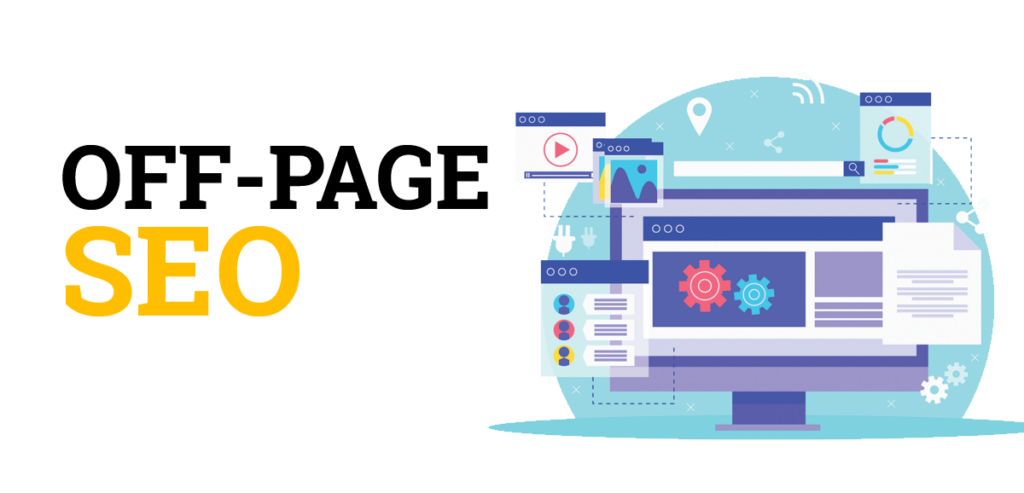Off-page SEO (also called “off-site SEO”) refers to actions taken outside of your own website to impact your rankings within search engine results pages (SERPs) and to influence how people discover and engage with your content.
Is a strategy for bringing attention and authority to your site, and when combined with on-page SEO and technical SEO, off-page SEO can help you meet your goals for search visibility, crawling, indexing, traffic, and conversions.
Off-page optimization seeks to improve the perception both search engines and people have of a site’s:
- Expertise
- Experience
- Authoritativeness
- Trustworthiness
- Relevance
- Popularity

Why does Off-Page SEO matter?
Off-page SEO is tremendously valuable because it tells search engines that your website is important to others on the web. Every link that you receive acts as an endorsement from another source that your website is quality.
This lets external sources act as tie-breakers for websites that have the same quality of on-page SEO so search engines know the best to rank websites on search engine results pages (SERPs)
Search engines like Google measure off-page SEO factors, like the number and quality of backlinks to websites. If one of the wedding websites has more backlinks from reputable sources, while the other site has received zero online mentions, the site with more backlinks (and better online reputation) will likely rank higher.
Using numerous off-page and on-page SEO factors, search engines determine how valuable pages are to searchers’ queries and return relevant results accordingly.
Just remember — a page without off-site optimization is like a wedding without invitations. It’ll become a no-show.
3 types of links for off-page SEO
Links are a critical component to off-page SEO. Before you start building or earning backlinks, it’s essential to understand the different types of links, as well as the factors that influence the equity of a link to your website.
The three types of links include:
Natural links
A natural link comes to your website naturally. Your team doesn’t take any action or conduct any outreach to earn the link. The person writing that content decided to link to your content, whether because they follow your brand or discovered your content via search. Either way, they found your content valuable and worth highlighting.
Built Links
A built link comes to your website from outreach. Your team worked to earn this link, whether by reaching out to webmasters, publishers, or journalists. You may have even promoted the content with an ad campaign, providing it with the exposure that helped people uncover the content. Even though you built this link, you still created valuable content for users.
Created Links
A created link comes to your website from self-submissions on directories, forums, or press releases. Your team created this link intentionally and without conducting any outreach. This off-page SEO tactic for link building tends to register as a black-hat SEO practice because search engines look down on this kind of link building tactic. When building links, focus on natural or built links.
6 factors that influence link value for off-page SEO
You also want to think about the equity or value and authority passed by a link. While you could attract dozens of low-value links from spammy or untrustworthy websites, they won’t help your business rank well in search results. That’s why it’s essential to focus your off-page SEO link building efforts on trusted websites with excellent link equity.
The six factors that influence the equity passed by a link include:
- The freshness or age of the link to your site
- The number of links on the linking page
- The relation between the linking site’s subject matter and yours
- The trustworthiness of the linking site
- The authority of the linking site and the linking page
How to do off-page SEO for your SEO campaign
Now that we’ve established how important off-page SEO is to a website’s success, we can delve into the specifics of how to improve off-page SEO:
Link building
The most popular technique of off-page SEO is backlinking, which aims to generate natural links to your page.
Getting reputable websites to link back to your website has two main benefits: driving traffic to your site and helping determine your rank. Links from reputable sites are hugely beneficial to your website.
These benefits occur because links are the primary way to navigate the internet. Links improve your users’ experience. With links, your users can easily navigate to other information they find relevant.
Links are also the simplest way to measure the expertise, authority, and trust of a site. That’s why Google includes links as a part of search ranking factors.
But how do you convince others to link to you? You can try any (or all) of the following off-page search engine optimization strategies to start.
- Join an association. This could be an industry association, or the local Chamber of Commerce. Make sure that your company gets a link on the association’s website.
- Create quality content. Making high-quality blog posts, infographics, videos, and more are all excellent ways to draw clicks and natural links to your site. Basically, if it’s interesting, they will come.
- Reach out. Reaching out to journalists and bloggers as possible sources for their writing, or asking them to host something you’ve created, provides future opportunities for you to earn links to your website.
Some links have more weight than others. For example, links from influencers in your audience’s community have much more authority than links from spam sites.
Those high-quality links will tell Google that you’ve earned the recognition — that your site knows its material — and Google will rank you higher.
Blogging
Blogging is an excellent way to start generating linkable content for your brand. There’s no other place on the web with a constant stream of long-form content than blogs.
On your blog, your audience can comment and share your content, making it easier to get noticed and start generating natural links and brand mentions.
And with the continuous posts, you’ll become a knowledgeable leader in your industry. Your audience will look to you first for information about recent updates and trends, as well as how-to guides and informational articles.
Talk about generating loyalty!
Social media marketing
While social media links don’t impact rank, social media sites are still some of the best places on the web to generate awareness for your brand.
Brands with a strong presence on social media feel open and approachable, which is something that is becoming increasingly important today for businesses.
If a brand is not easily approachable, not only does it come off as abrasive, its trustworthiness comes into question when users can’t easily access information about it.
Instead of appearing as some aloof entity, let your brand come across like a friendly, neighborhood corner store.
You can do that by staying active on social media sites and by starting a blog where you can let your audience get a feel for your brand’s flair.
Also, generate content that is relevant and easy to read, and respond positively and sincerely to comments on both your blog and social media pages. Doing this will help your brand feel like a group of people instead of a robot.
Influencer marketing
How can off-page SEO influence online opinions?
Because of the emphasis on links as a method of accomplishing off-page SEO, many people tend to assume generating links is the goal of off-page SEO. The real goal of off-page SEO, however, is to boost ranking so that people can find, contact, and purchase from you. Off-page SEO will create positive engagement with your brand, whether that be through links, reviews, social media, or brand mentions.
Off-page SEO can be tricky, though, because those methods are ones you can’t control, not without being considered black-hat, and no one wants to wear a black hat. There’s no surer way to plummet your brand’s credibility or your rank than with black-hat SEO methods like paying employees to post positive reviews or buying links to your site.
And since you can’t control off-page SEO in the same way that you can control the on-page elements of your site, off-page SEO can turn into a frustrating waiting game where all you can do is hope the response from your audience is positive.
One of the ways you can combat negative reviews is by:
- Reaching out to your customers, asking them for a review after a purchase
- Implementing changes that will resolve the valid concerns of those negative reviews
By doing these two things, you’ll improve your products and services and generate more reviews.
Writing for publications
Writing for external publications is a great way to show that you’re an authority in your industry while also promoting your own business’s service. This kind of publicity gives you huge potential for attracting customers that otherwise may not have heard of you. Plus, it can give you a portfolio of writing that you can show to other publications to start writing for them, and so on.
Social bookmarking
Social bookmarking is the process of submitting your content to sites like Stumble Upon, Tumblr, Reddit, and others. These sites segment their content to appeal to certain niches, which you can use to appeal to customers in the specific demographics that you want to target. Before you submit any content, though, make sure to research the audiences and rules of each site.
Off-page SEO is the collection of strategies, tactics and efforts you undertake to promote your content on third-party sites across the web. This part of SEO focuses on getting your site, company and/or brand discussed on another website.
You’ve most likely heard of off-page SEO before in the context of building links to your website. It’s true that backlinks are very important, and we’ll go over them a bit below, but there’s much more to off-page SEO than just links.
Off-Page Factors:
Backlinks: Backlink quality and quantity are still some of the most important factors for off-page SEO. Backlinks are so important that Google has dedicated multiple algorithm updates to fighting link schemes and link spam. Links are important for off-page SEO because they pass what’s known as “link juice” to your site, helping it to appear more authoritative and trustworthy in the eyes of search engines. There’s a lot that goes into backlinks so we recommend our in-depth guides to building links, evaluating backlink quality and conducting a link audit.
Social media: While a page’s ranking isn’t directly influenced by how many shares, likes or comments it has, social media is still an important channel to promote your site online. Social media helps people find and engage with your company online and helps you reach new and existing customers. Plus, Google indexes pages on the major social media platforms, so consistently posting to these sites helps you control your brand SERP.
Unlinked mentions: Unlinked mentions are any time an unaffiliated site mentions your company name or website online without linking back to your site. It’s rare, pretty much impossible, for every mention of your site or brand online to include a backlink. In fact, if that were the case Google would probably find that very suspicious and levy a penalty against your site. However, that doesn’t mean unlinked brand mentions don’t have any value for off-page SEO. They can still function as citations for your site’s authority and trust. Plus, mentions offer up a great opportunity to create new backlinks.
Google My Business: Google My Business (GMB for short) allows businesses to easily and simply provide important information directly to Google. This information includes location and/or service area, business type, contact information and opening hours. GMB is also how Google populates results for the Google local pack and Google Maps searches. As such, it’s a vital off-page SEO factor for any local business that relies on traffic from a specific geographical location. Set up your business’s GMB listing to add it to Google Maps and take advantage of this important off-page and local SEO technique.
Start Optimizing Your On-Page and Off-Page SEO
Remember that a good SEO strategy isn’t about choosing between on-page SEO and off-page SEO. That would be like trying to decide between putting tires or an engine in your car – you need both to get wherever you want to go.
However, SEO works best if you’ve got good on-page SEO before you spend too much time and effort (and not to mention money) on building links or promoting your site on social media.
With the data and insights available, you’ll be able to create the perfect strategy to target both on-page SEO and off-page SEO to reach a wider audience and attract more visitors to your website.


